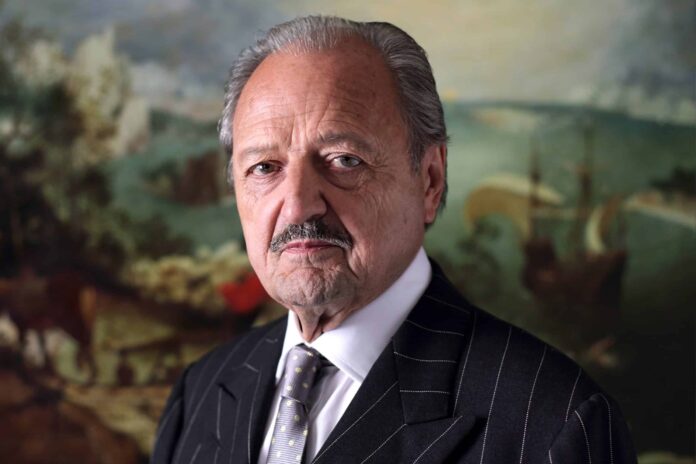Bounder, criminal, and villain are all words that come to mind while thinking about a villain. Whether you’re a dandy, a duke, or a diplomat, you’ll Peter Bowles, who died of cancer at the age of 85, may have been any of these incarnations, and frequently two or three at the same time.
Bowles, who was always admired and respected, ruefully admitted that he wasn’t a “star” until he played Richard DeVere, a former costermonger turned supermarket tycoon, in the BBC’s hit comedy series To the Manor Born (1979-81), written by Peter Spence, in which he competed for Penelope Keith’s not so merry widow Audrey fforbes-affections Hamilton’s and superior social status.
Audrey, troubled by debts and death duties, was forced to downsize and set up home in the lodge on her own estate, now owned by a hideous arriviste, was the sure-fire premise of a great class-conscious comedy. Two brilliant comic performances fueled the ripples of resentment, compromise, and green shoots of affection; while Keith had already achieved national stardom in The Good Life – Bowles had turned down the role played by Paul Eddington in that series – this was his moment, and he seized it with relish.
It was nothing unusual to have a sophisticated villain or a refined cad. Bowles, on the other hand, may hint at issues that go beyond the elegant exterior. His attractiveness was sometimes used as a cloak for genuine menace or cruelty, as well as spivvy, and there was always a whiff of phoniness about the smooth-talking self-assurance. He was always well dressed, either off-stage or off-set, with noticeable pinstripes and high, starched collars.
This was due to his upbringing. Both of his parents worked in domestic service, but solely for the quality, as they used to remark. Bowles was born to Sarah Jane (née Harrison) and Herbert Bowles in Upper Boddington, Northamptonshire, 12 miles from Banbury. Sarah was nanny to Lady Jeanne Campbell, Lord Beaverbrook’s granddaughter, whose mother married the Duke of Argyll, while Herbert was valet to Drogo Montagu, son of the Earl of Sandwich.
In 1940, the Bowleses relocated to Nottingham, to a two-up, two-down (with outdoor lavatory) where Herbert worked for Rolls-Royce and Peter attended High Pavement grammar school, which was also the alma mater of comic John Bird. Bowles received a scholarship at Rada in London after being inspired by his own talent in school plays and the success of two past students, Philip Voss and John Turner, who had both entered the acting profession with success.
He shared a flat with Albert Finney (along with Peter O’Toole, Richard Briers, and Alan Bates) and won the Kendal award; he and Finney were quickly hired by MCA, the premier US talent agency.
Bowles made his professional debut in Nottingham Rep’s Julius Caesar in 1955, followed by debuts at the Old Vic in London and New York the following year in Romeo and Juliet (in the tiny part of Abraham), where he met future collaborators James Villiers and Bryan Pringle.
When he starred in John Arden’s This Happy Haven (as the sole unmasked character) and alongside Rex Harrison in Chekhov’s Platonov at the Royal Court in 1960, he felt he’d found his way to classical theatrical fame. William Gaskill directed the Arden production and also taught Bowles lessons in movement, masks, improvisation, and play creation. Bowles implored Gaskill to take him alongside other Royal Court players including Joan Plowright, Robert Stephens, and Colin Blakely when Gaskill was named associate director at the new National Theatre by Laurence Olivier, but Gaskill declined.
After brief performances with Coral Browne (in Bonne Soupe at Wyndham’s in 1961) and in a Séan O’Casey production at the Mermaid in 1961, he rushed into cinema and television, quitting the theatre for 11 years. He made his debut as a movie gangster in Ken Annakin’s black-and-white The Informers (1963), followed by four major screen projects: Antonioni’s Blow-Up (1966), co-starring David Hemmings (as a photographer) and Vanessa Redgrave; Tony Richardson’s The Charge of the Light Brigade (1968), also starring Hemmings and Redgrave, as well as Trevor Howard and John Gielgud; and Richardson’s (1969), adapted by Edward Bond from Vladimir Nabokov, in which a blinded art dealer’s wife convinces her lover to move in with them (Nicol Williamson replaced a sacked Richard Burton during the shoot); and Peter Medak’s film of Peter Nichols’s A Day in the Death of Joe Egg (1970), in which he lent notable support to Alan Bates and Janet Suzman as the parents of a disabled child as a well-meaning old schoolfriend.
Sean Connery made a fantastic performance as a flaky police officer investigating a child abuse suspect (Ian Bannen) in a psychodrama adapted by John Hopkins from his own stage piece This Story of Yours in Sidney Lumet’s The Offence (1973).
The start of a 16-year association with Rumpole of the Bailey as Guthrie Featherstone QC MP in 1976, and a much-loved episode of Rising Damp starring Leonard Rossiter in 1977, in which he wafted through as a cravat-wearing playwright named Hilary, dividing his flirtatious “rehearsal” attentions between Frances de la Tour and a long-haired Richard Beckinsale.
He returned to the stage in Alan Ayckbourn’s Absent Friends (1975) at the Garrick, humiliated by his wife (Pat Heywood) and pushed to the limit by a bereaved and boring friend (Briers), and in 1976 filled his lunchtimes with a hilarious turn as a north country Labour MP in Tom Stoppard’s Dirty Linen at the Almost Free in Rupert Street before it transferred – to run for seven years –at the Arts.
Bowles, who collected British art and exercised with “physical jerks,” was named ITV personality of the year by the Variety Club in 1984 and received an honorary doctorate from Nottingham Trent University in 2002. Ask Me If I’m Happy (2010) was an anecdotal memoir, while Behind the Curtain was a manual on what he called “the job of acting” (2012).
Susan, his wife, and their three children, Guy, Adam, and Sasha, survive him.













